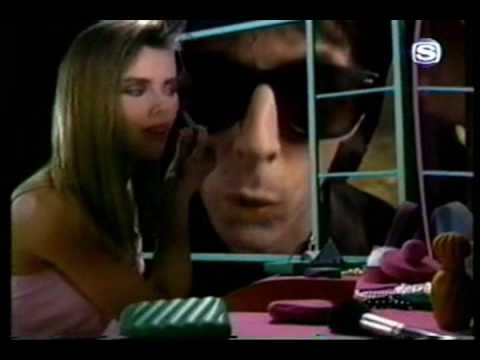
by Robert Barry
The competition was stiff. Amongst the other nominees were Herbie Hancock’s ‘Rockit’, Cyndi Lauper’s ‘Girls Just Wanna Have Fun’, the Tobe Hooper-directed clip for Billy Idol’s ‘Dancing With Myself’, and the epic $500,000 mini-movie of Michael Jackson’s ‘Thriller’. But the first ever MTV Video Music Award for Video of the Year went to the number 7 hit, ‘You Might Think’ from Bostonian new-wavers, The Cars.
Opening in a computer-generated apartment with black walls and an ominously cloudy ‘real’ sky visible through the window, a scantily clad brunette lounging on a bright blue bed. Suddenly, gravity evaporates and everything starts floating upwards before switching into an assortment of curiously mundane objects (a car door, a hammer) which then fall into a hall opened up in singer Ric Ocasek’s head.
Ocasek’s dour mien, clad in black shades and sullen expresion, subsequently turns up in a series of improbable blue-screened situations – popping out of a lipstick, holding a road drill to the girl’s mouth, in a submarine in her bathtub, and so forth – in an increasingly desperate attempt to catch the attention of our negligéd heroine until he finally gives up, unscrews his own face and lets a waterfall pour out. The clip ends with the words “The End” vomiting themselves up onto the screen in the kind of slime font familiar from children’s television.
Considering what it was up against, and how very badly the (then pioneering) visual effects have aged, the panel’s choice might be considered ill-judged. Such are the benefits of hindsight. But at the same time, The Cars’ video is bang on the 1984 zeitgeist.
In the year William Gibson wrote Neuromancer and first developed the term ‘cyberspace’ as a “consensual hallucination”, ‘You Might Think’ shows us a computer-generated virtual world in which the line between real and fake objects is constantly transgressed, and any kind of screen – mirrors, windows, etc. – can be a door into another reality. In the year Fredric Jameson first elaborated his thesis of postmodernism as “the cultural logic of late capitalism”, The Cars offer an ironic play of referents from films and popular culture with the logic of a Magritte painting; a pop art collage of decontextualised signifiers without signification, somewhere between a Pynchon novel and a Las Vegas strip mall.
Corny as ‘You Might Think’ looks now – and revered as ‘Thriller’ undoubtedly deserves to be – it’s nonetheless easy to see which was the nostalgic tribute to a lost past and which was grasping towards some dimly visible future; which was borrowing its forms from other art forms and which was trying, no matter how clumsily, to create a distinctive aesthetic for music videos sui generis.
Read it in other languages French, Italian and German HERE



